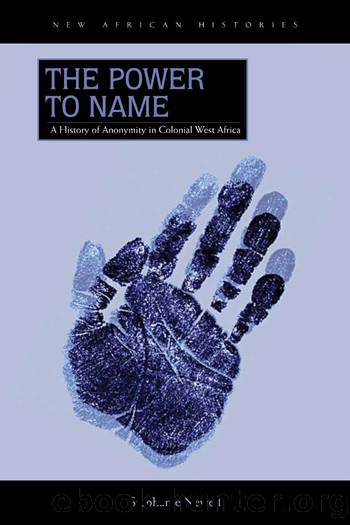The Power to Name by Stephanie Newell

Author:Stephanie Newell [Newell, Stephanie]
Language: eng
Format: epub
Tags: Social Science, Media Studies, Literary Criticism, African, Books & Reading, History, Africa, General
ISBN: 9780821444498
Google: BYmGAAAAQBAJ
Publisher: Ohio University Press
Published: 2013-07-15T01:41:53+00:00
For reasons best known to me, however, I have not as yet published the [latter two]. In the tale âLoving and Liking,â I endeavoured to prove that though we are only âBlack Englishmenâ we have correct ideas of the meanings of the two words, to love and to like . . .
In the other story, âMunicipality,â I endeavoured to have this burning question of the day fully dissected in a discussion between some very principal factors, although that tale was also a love story.43
Erneâs Friend takes for granted the belief that the value of creative writing lies in the ethical debates that stories will stimulate among readers, without the interventions or presence of an identifiable author. Akin to parables, stories thus function as didactic and discursive tools, created by authors to lever open and expose the moral core of âburningâ social issues such as marriage by ordinance, romantic love in Africa, the creation of a colonial municipality, or the education of women. Perhaps this is why readers rarely commented directly on stories or expressed curiosity about the identities of authors. The preference of readers to debate the moral issues raised by the story, rather than to comment on the content and form of individual narratives, indicates the existence of a literary culture in which the publicness of literature was conferred by the avoidance of attribution. A search for ârealâ authors seems misplaced in such a context, and as a sign of its futility, such searches frequently lead the researcher further into a labyrinthine paper trail of pseudonyms: a hunt for the author of Erneâs Friend, for example, runs dry at âThe Czar,â author of âCruelly Treatedâ in 1889.44
Bearing in mind that women as well as men can express patriarchal views, the three early works of fiction discussed in this chapter illustrate a dilemma common to feminist literary scholarship: although the desire to discover an authorâs gender is problematically essentialist, there are many reasonsâintegral to the texts and extraneous to each storyâto suppose that Marita; or The Folly of Love, Adelaide of Adelaide Street, and Guanya Pau: A Story of an African Princess were indeed all written by men. Internal evidence includes the masculine positionality of each narrative. Extraneous evidence includes the authorâs name, as in Joseph Waltersâs case, or information about the author, such as the editor of the Western Echoâs reference to the ânative gentlemanâ author of Marita; or The Folly of Love.45
Lady Cliffordâs choice of the genre of the letter for her genderdivided schoolchildrenâs competition reflects the outward-oriented, proselytizing character of literacy in Britainâs coloniesâthe need for a full âcorrespondenceâ between writers and readers. One could argue that the printed material discussed in this sectionâfor and about African womenâcontributed to the production of the very differences in theme and preoccupation that caused womenâs writing to be neglected and labeled irrelevant in subsequent decades.46 As with Lady Cliffordâs writing competition, however, the African-authored texts examined earlier reveal the extent to which gender was produced and monitored in colonial societies
Download
This site does not store any files on its server. We only index and link to content provided by other sites. Please contact the content providers to delete copyright contents if any and email us, we'll remove relevant links or contents immediately.
| Booksellers & Bookselling | General |
| History of Books |
4 3 2 1: A Novel by Paul Auster(12343)
The handmaid's tale by Margaret Atwood(7713)
Giovanni's Room by James Baldwin(7272)
Asking the Right Questions: A Guide to Critical Thinking by M. Neil Browne & Stuart M. Keeley(5722)
Big Magic: Creative Living Beyond Fear by Elizabeth Gilbert(5694)
Ego Is the Enemy by Ryan Holiday(5365)
The Body: A Guide for Occupants by Bill Bryson(5040)
On Writing A Memoir of the Craft by Stephen King(4896)
Ken Follett - World without end by Ken Follett(4691)
Adulting by Kelly Williams Brown(4540)
Bluets by Maggie Nelson(4522)
Eat That Frog! by Brian Tracy(4486)
Guilty Pleasures by Laurell K Hamilton(4398)
The Poetry of Pablo Neruda by Pablo Neruda(4072)
Alive: The Story of the Andes Survivors by Piers Paul Read(4003)
White Noise - A Novel by Don DeLillo(3983)
Fingerprints of the Gods by Graham Hancock(3968)
The Book of Joy by Dalai Lama(3951)
The Bookshop by Penelope Fitzgerald(3818)
